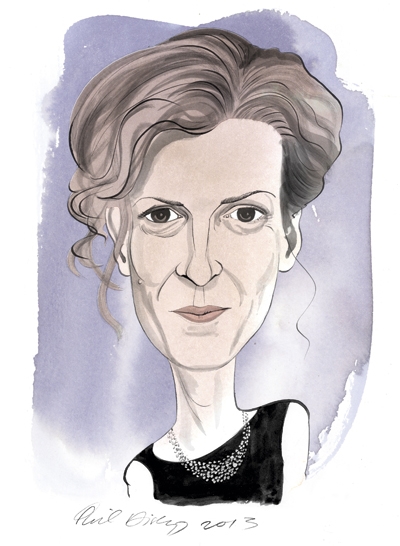It’s Monday lunchtime, downstairs in the Spectator office, and Boris Johnson is trying to flog a bus to a Frenchwoman. ‘What about the new Routemaster? It’s absolutely great, yup, fantastic, yup. Hey, they could be really good for Paris,’ he says. She smiles and says nothing. ‘Well what about bendy-buses then?’ he carries on. ‘We’ve got a few of those you can have…’
‘Come on, please’ she interrupts, kindly but firmly, in excellent English. ‘Stop your recycling with me.’
Has Boris met his match? Her name is Nathalie Kosciusko-Morizet, she’s just turned 40, and she’s running to be the next mayor of Paris. Boris calls her ‘terrific’, and it’s easy to see what he means. NKM, as she’s called in France, is hyper-intelligent, pro-business, and centre-right. Plus, let’s not be coy here, she’s a bit of a hottie. She wears trendy clothes, has fierce clever eyes, and exudes a sort of minxy froideur.
As a Frenchwoman, NKM may be more or less impervious to Johnson’s charm. As a Parisian mayoral candidate, however, she seems almost desperate to strike up a bond. She wants to emulate Boris’s political achievements, first by winning back the capital next year from a socialist rival (in her case Anne Hidalgo, the current deputy mayor, who is ahead in the polls), then by making Paris more of a magnet for money from abroad. ‘The Parisians, and indeed the French, have for some time been taking their professional experiences elsewhere,’ she tells me. ‘And as we know, many are attracted to London — and I have absolutely no problem with that…. But I’d like to see Paris become as attractive to Londoners as London is to Parisians. Why should it not be?’
Clearly, NKM wants some of Boris’s charismatic ju-ju to rub off on her. At a time when the mood across Europe is so hostile to politicians, his brand of anarchic charm is a winning ticket. Before lunch, in the Spectator garden, surrounded by a French news crew, she did some fairly heavy–duty flirting with him for the cameras. Afterwards, she tweeted that she had enjoyed a ‘déjeuner très pétillant [bubbly] avec @MayorofLondon’. One of her team told me that Boris’s ‘refusal to do things in an official or conventional way, people really respond to that. Nathalie can do that.’
But can NKM really imitate Johnson’s very English appeal? At lunch, we had several moments of Anglo-French disconnection. Over the meringue, for instance, she asked the table — sérieusement cette fois — what London can offer Paris. Boris, having exhausted his bus-salesman routine and performed a fairly lengthy oration on ‘les shoots verts’ of our economic recovery, decided to duck the question.
‘Come on guys, what else have we got?’ he asked, looking down the table at the assortment of journalists and distinguished Conservatives. A tense pause ensued. ‘Er… the Proms?’ one of us suggested, tentatively. ‘Land of Hope and Glory!’ bellowed someone else.
We all laughed. But NKM and her clever-looking advisers fell quiet, disconcerted. Perhaps all this public-schoolboy -amateurishness isn’t just an act after all, they seemed to be thinking. Perhaps the London mayor really is winging it. Perhaps that’s why it works.
Nathalie does have certain superficial similarities to Boris. They are both descended from immigrants; in his case, Turkish; in hers, Polish. They are both mega-ambitious, quick-witted, and products of their countries’ respective elites: he read classics at Oxford, she is an engineering graduate from l’École Polytechnique — arguably the grandest of France’s grandes écoles.
Deep down, though, they couldn’t be more different. He is dead funny. She is dead serious, and comes from a long line of political insiders. Her father was mayor of Sèvres; her grandfather was an ambassador to the UN; and her great-grandfather, André Morizet, was a communist senator.
Might such an establishment background limit her popular appeal? ‘We are not a dynasty,’ she snaps. ‘We have inherited a love of France, a love of serving France. I see that as a richness, not as a problem — and frankly I find this question quite shocking.’
Oh dear. NKM is pretty guarded. She won’t be drawn into speculating as to whether former president Nicolas Sarkozy will make a comeback. Nor will she say if she supports François Fillon or Jean-François Copé, the two men still vying to lead her party, l’Union pour un Mouvement Populaire (l’UMP). She rejects the common view that l’UMP is hopelessly split and that Marine Le Pen’s National Front is bound to gain. ‘This has always been the socialists’ trick — since Mitterrand,’ she says. ‘They always try to increase the popularity of the National Front and say that the right is divided. That’s why Hollande pushed ahead with gay marriage.’
She is also anxious to distance herself from an earlier quote that suggested she revered Margaret Thatcher. ‘All I said was that I had a certain amount of admiration for her personality and that I was moved by the film The Iron Lady. In terms of political outlook, my views are quite different. I have tried to construct a dialogue with the unions.’
I press on and try to suggest that she could be France’s Thatcher — the first Madame la Présidente. ‘That’s not really a question that’s based in reality,’ she says.
But you can’t help feeling she likes being asked.







Comments